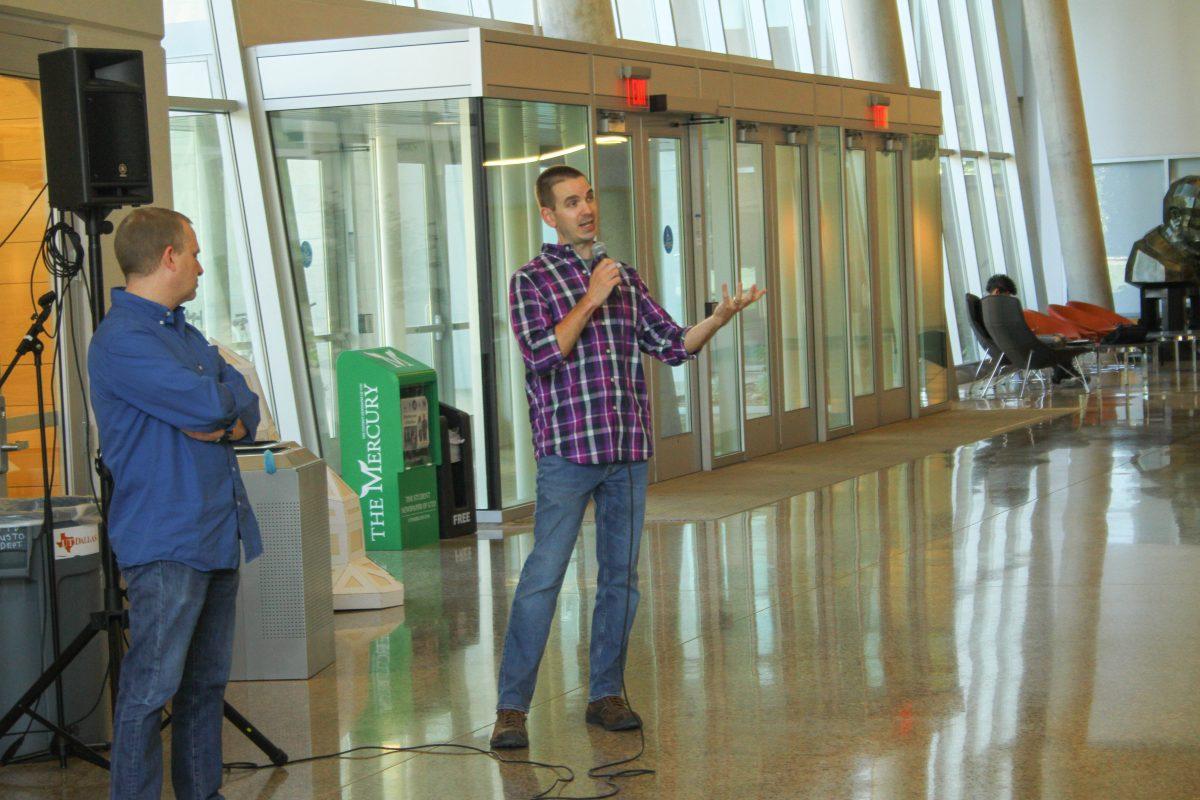In a previous version of this article Todd Fechter’s name was misspelled, The Mercury regrets this error.
The Edith O’Donnell School of Arts and Technology may undergo a restructuring of the school’s two degree programs. The proposed change would merge ATEC and EMAC and bring additional changes to the graduate program. Final approval from the Texas Higher Education Coordinating Board could come as early as May.
“We’re anticipating it’s going to go very well at the state level. We’re not going to on day five of fall semester say, ‘All classes are cancelled.’ We’re not going to do that. … We’re moving forward anticipating approval,” said Eric Farrar, associate dean of undergraduate studies, at the town hall.
On April 5, ATEC faculty and staff held a town hall for undergraduates, the first public forum since the changes were announced a month ago. After a short presentation discussing details and dispelling rumors, Farrar, Senior Associate Dean Todd Fechter, ATEC Dean Anne Balsamo and Associate Dean of Academic Administration Lisa Bell, as well as other advisors and faculty members answered questions about the future of ATEC.
The plan is to fuse ATEC and EMAC into one unified program named Art, Technology and Emerging Communication. The update would also implement a portfolio review and incorporate five pathways, or specializations, for students to choose from: animation, games, critical media studies, design and production or mediated communication.
“(We wanted to make) a larger more cohesive program and the other thing … is the ability of the current degree program to pick and choose and not dive deep into any one particular topic,” Farrar said. “It doesn’t do the students service if they’re not forced to get deeper into a particular topic.”
A common theme among students at the town hall was concern about the availability of classes needed to satisfy degree requirements. Several professors were not renewed for the fall, leaving courses potentially unavailable.
While ATEC could fill as many as seven tenure-track and 12 non-tenure professor positions, the statewide hiring freeze is delaying the process.
“We have to wait until August for our new hiring plan. … The entire state is under a hiring freeze so we’re very lucky we got a lot of our jobs posted before then,” Balsamo said. “Our next phase is as soon as the hiring freeze is lifted. … We hope to have people lined up so once the jobs are posted we can start taking applications.”
Another difficulty ATEC faces in hiring faculty is recruiting experienced industry professionals who have an academic background or are interested in teaching at a university.
“Finding qualified industry professionals that also have the academic credentials that allow them to teach at the university level, it’s hard,” Farrar said. “People that are in production number one are not necessarily looking for academic jobs, or they don’t know or they don’t think they’re qualified meaning they don’t have the academic credentials to teach at a university.”
However, a new professorial job introduced by the UT System Board of Regents called professor of practice would allow ATEC to hire an industry professional that does not have a master’s or doctoral degree.
While the process began at the administrative level over a year ago, for many students, such as sound design sophomore Catharine Nanagas, news of the restructuring was surprising and sparked rumors such as game design or sound design being eliminated from ATEC.
“I wish that they had done this earlier because … rumors fester and even if we dispel them the feeling is still there,” she said. “The timing is really off but I’m glad they’re opening it up and they’re saying, ‘This is what we’re doing and we want your questions and we want you input’ and it’s better late than never.”
However, Farrar said the administration couldn’t disseminate information about the program until it was finalized.
“That’s why for some of you it seems like it’s being done in a black box with a lack of transparency. It’s not because we didn’t want to share it with you guys, it’s because we’re limited by the state exactly what we can share with you once we get final approval,” he said at the town hall.
With all of these changes coming by next fall, Nanagas said she wishes ATEC administration had communicated with students better.
“I’m going to be a junior next year and I even asked a question about what they’re doing infrastructure wise while they’re looking for faculty and they gave a vague answer for something that’s happening in a few months and that’s a little bit disheartening,” she said. “That’s the issue going on right now and of course they have a lot to think about in terms of long and short term but as a personal note I just wish they had more to say now.”

















